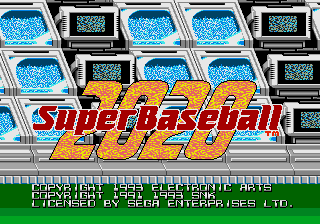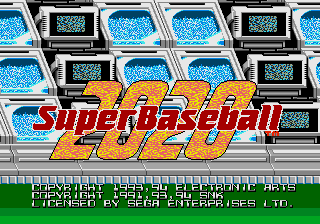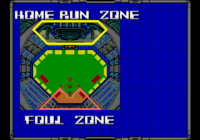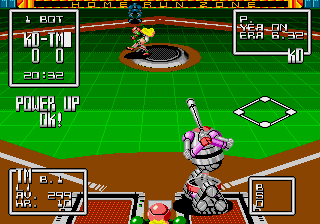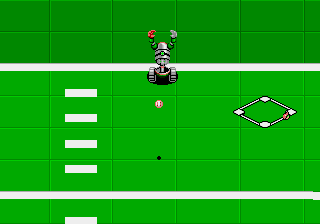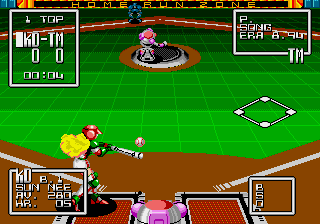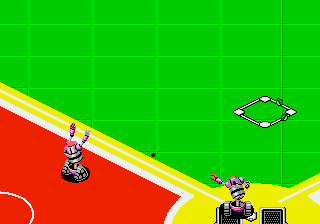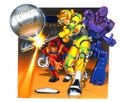2020 Super Baseball is a 1991 Neo Geo arcade baseball game with a futuristic setting by SNK and Pallas. Electronic Arts ported it to the Sega Mega Drive in 1993, calling it Super Baseball 2020 in the US and Europe and 2020 Nen Super Baseball (2020年スーパーベースボール) in Japan.
Gameplay
The game plays similar to a conventional baseball game but with several changes and additions. The game includes both male and female characters as well as robots. All three types of players have the same basic abilities and vary only on their personal strengths. Human players can lose their upgrades if overworked, whereas robot players can blow up. This happens if the player constantly makes them dive for a ball, run extra bases, or even if they get hit by a pitch. Some robots, especially pitchers, naturally run out of power as the game progresses, losing all their abilities, both offensively and defensively. When that occurs, the player can either power-up or replace them with someone else on the roster. Human players do not blow up, but human pitchers can tire out and throw the ball very slowly. This can be remedied by either an upgrade or, as in real baseball, switching to a relief pitcher.
During the game, players can earn money doing certain things, ranging from throwing a strike ($100) to hitting a grand slam ($10,000). Players can earn money both on defense and offense, and the money earned gets saved for use at any time during the game (but money does not carry over into subsequent games). Money can also be deducted, such as from taking a strike (on offense) or hitting a batter by a pitch (on defense). At any point in the game, the player can pause the game with START and spend money on upgrading players. For human players, the player can upgrade three different abilities: hitting, fielding, and pitching. Upgrading hitting power will allow the player's character to hit the ball farther; fielding power will allow them to run and throw the ball faster when on defense, and pitching upgrades (used only for pitchers) will allow a player to pitch the ball faster and more accurate. Robots can only be upgraded to more powerful robots, which upgrade all of their attributes; human players can also be upgraded to robots.
Apart from the futuristic characters, the field has been revamped and redesigned. There is only one stadium in this game, known as Cyber Egg Stadium. A ball hit over the outfield fence is no longer a home run unless it is hit directly over the fence in center field. The reason the home run zone was reduced is because the hitters are far more powerful and have the ability to blast the ball tremendously far. Only the most powerful hitters can have the accuracy and strength to hit the ball far enough to get a home run. The other areas of the outfield stands are covered with a protective glass that cause the ball to bounce off of it and bounce back in play onto the field. The foul zone has also been reduced. It is now shorter and only encompasses the area directly behind first base through third base. Weaker batters can often get a hit by swinging early or late at the ball, causing it to just barely make the fair zone in what would otherwise be the foul zone in normal baseball.
Other features are also present on the field. Stop zones are present just past the field behind first and third base. If the ball touches these rectangular spots, it stops dead. However, stop zones are small, and the ball can often bounce right over them without stopping. Near the fence are jump zones, in which a player gets an extra boost in jump height to catch a ball that is otherwise going to go over the fence. Jump zones are placed all throughout the stadium's fences. In addition, after a few innings, "crackers" are put on the field. Crackers are landmines that launch the player in the air when are stepped on, delaying the player's time to make a play.
The single-player game is played as a 15-game season. The player chooses a team from the two leagues and plays three games against each of the other five teams in the league. If the player is first place at the end of the season, the player progresses to the Super Baseball 2020 World Series game against the other league's champion. There is a password system for continuing the season. The two-player game is a single match-up against another player. Players must choose a league and pick teams from the same league.
|
|
Defense
|
When pitching, use  and and  to position the pitcher on the mound and to position the pitcher on the mound and  to throw the ball. While throwing, to throw the ball. While throwing,  and and  break the ball, break the ball,  slows the pitch, or slows the pitch, or  speeds up the pitch. The batter is eliminated when three strikes are thrown; the batter gets a free base if the pitcher throws four balls or hits the batter. If an opponent is trying to steal a base, the pitcher can run to a base for a tag-out with speeds up the pitch. The batter is eliminated when three strikes are thrown; the batter gets a free base if the pitcher throws four balls or hits the batter. If an opponent is trying to steal a base, the pitcher can run to a base for a tag-out with  and a direction or throw to a base with and a direction or throw to a base with  and a direction (with the directions corresponding to the bases: and a direction (with the directions corresponding to the bases:  for first, for first,  for second, for second,  for third, or for third, or  for home). The player can substitute a relief pitcher or purchase an upgrade by pausing the game with START . for home). The player can substitute a relief pitcher or purchase an upgrade by pausing the game with START .
When fielding, the D-Pad controls all of the fielders simultaneously (with the camera focused on the one closest to the ball). The player can have the nearest fielder jump by pressing  or dive by pressing or dive by pressing  while holding a direction. Once the ball is in possession, it can be thrown infield by pressing while holding a direction. Once the ball is in possession, it can be thrown infield by pressing  while holding a direction corresponding to the base. The player can run with the ball by holding while holding a direction corresponding to the base. The player can run with the ball by holding  with a direction. with a direction.
|
|
|
Offense
|
When hitting, use the D-Pad to position the batter in the batter's box and  to swing or to swing or  to bunt; the batter stops swinging when the button is released. The player can instruct a runner to lead-off or steal a base by pressing to bunt; the batter stops swinging when the button is released. The player can instruct a runner to lead-off or steal a base by pressing  while holding a direction corresponding to a base ( while holding a direction corresponding to a base ( for first, for first,  for second, for second,  for third, or for third, or  for home). The player can substitute a pinch hitter or purchase an upgrade by pausing the game with START . for home). The player can substitute a pinch hitter or purchase an upgrade by pausing the game with START .
|
Prizes
Offense
| Play |
Prize/Penalty
|
| Single |
$300
|
| Double |
$500
|
| Triple |
$800
|
| Solo homer |
$3,000
|
| Grand slam |
$9,000
|
| Strike |
-$10
|
| Out |
-$50
|
| Strike-out |
-$100
|
Defense
Players can be injured by being hit by a pitch, in which case they are removed from the game by a flying ambulance and replaced with a spare robot and a greater fine is incurred.
| Play |
Prize/Penalty
|
| Jumping catch |
$1,000
|
| Diving catch |
$1,000
|
| Strike |
$100
|
| Out |
$800
|
| Strike-out |
$1,000
|
| Hit batter |
$1,000
|
| Hit batter (injured) |
-$2,000
|
Upgrades
There are three different levels of each upgrade, known as A, B, and C (with C being the most powerful and expensive). It is not necessary to have a lower level of upgrade to purchase a higher level, though there is no discount for purchasing a higher level if a lower level is already equipped.
Batting Armor
| Level |
Effect |
Cost
|
| A |
15% |
$2,000
|
| B |
25% |
$5,000
|
| C |
40% |
$10,000
|
Fielding Armor
| Level |
Effect |
Cost
|
| A |
12% |
$1,000
|
| B |
25% |
$3,000
|
| C |
42% |
$10,000
|
Pitching Armor
| Level |
Effect |
Cost
|
| A |
14% |
$10,000
|
| B |
26% |
$15,000
|
| C |
45% |
$20,000
|
Robot Upgrades
| Level |
Effect |
Cost
|
| A |
40% |
$5,000
|
| B |
60% |
$10,000
|
| C |
80% |
$30,000
|
Teams
There are two leagues. Each team has different strengths and weaknesses. Players are rated on Pitching, Hitting, Fielding, and Chance, and the team selection shows the average of the team's players.
Exciting League
- American Dreams (AD)
- Tokyo Samurais (TS)
- Naples Seagulls (NS)
- Taiwan Megapowers (TM)
- Korea Dragons (KD)
- Battle Angels (BA)
Fighting League
- Battle Heroes (BH)
- Ninja Black Sox (NB)
- Aussie Battlers (AB)
- Mechanical Brains (MB)
- Metal Slashers (MS)
- Tropical Girls (TG)
Production credits
- Development by: NuFX
- Produced by: The Hitmen
- Assistant Producer: Ken Rogers
- Technical Director: Lon Meinecke
- Sound Effects: Brian Schmidt
- Testing Manager: Randy Delucchi
- Product Testing: Ken Rogers, Tony "Louvre" Iuppa
- Product Manager: Dave Neubecker
- Marketing Art Direction: Nancy Waisanen
- Package Design: 13THFLOOR
- Package Illustration: Marc Ericksen
- Documentation: Michael Humes
- Documentation Design/Layout: Emily Favors, Corinne Mah
- Quality Assurance: Rich Rogers, Glenn Chin
Source: US manual[9]
Magazine articles
- Main article: Super Baseball 2020/Magazine articles.
Promotional material
Artwork
Physical scans
| {{{{{icon}}}|L}}
|
Division by zero.
|
Based on
0 review
|
| Mega Drive, JP
|
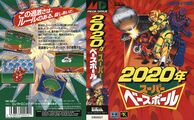 Cover
|
 Cart |
| Mega Drive, US
|
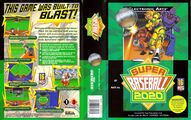 Cover
|
 Cart  Manual |
| Mega Drive, EU
|
 Cover
|
 Cart  Manual |
| Mega Drive, AU
|
 Cover
|
|
|
Technical information
- Main article: Super Baseball 2020/Technical information.
ROM dump status
| System |
Hash |
Size |
Build Date |
Source |
Comments |
|
|
|
| ✔
|
| CRC32
|
c17acee5
|
| MD5
|
ff340542ec290b92e03aa5115ea19c78
|
| SHA-1
|
a6ea6dcc33d60cf4d3be75b1cc867699811f8b3a
|
|
2MB
|
1993-09
|
Cartridge (US/EU)
|
|
|
|
|
| ✔
|
| CRC32
|
2bbee127
|
| MD5
|
7a07e37da58c5e8c2750ec7a4c1b37e9
|
| SHA-1
|
3d00178aecd7611c7e4ad09ea07e8436de6a5375
|
|
2MB
|
1994-02
|
Cartridge (JP)
|
|
|
|
|
References
- ↑ File:SuperBaseball2020 MD JP Box.jpg
- ↑ 2.0 2.1 https://sega.jp/history/hard/megadrive/software_l.html (Wayback Machine: 2020-07-02 23:21)
- ↑ GamePro, "October 1993" (US; 1993-xx-xx), page 152
- ↑ GamePro, "November 1993" (US; 1993-xx-xx), page 68
- ↑ 5.0 5.1 Edge, "October 1993" (UK; 1993-08-19), page 23
- ↑ Sega Force Mega, "December 1993" (UK; 1993-11-16), page 63
- ↑ Mega, "October 1993" (UK; 1993-09-16), page 45
- ↑ MAN!AC, "12/93" (DE; 1993-11-10), page 34
- ↑ File:Superbaseball2020 md us manual.pdf, page 45
- ↑ Špatný vliv (CZ) "Series 2, episode 6" (1994-xx-xx, ) (+0:00)
- ↑ Electronic Gaming Monthly, "September 1993" (US; 1993-xx-xx), page 34
- ↑ Sega Zone, "September 1993" (UK; 1993-08-xx), page 38
